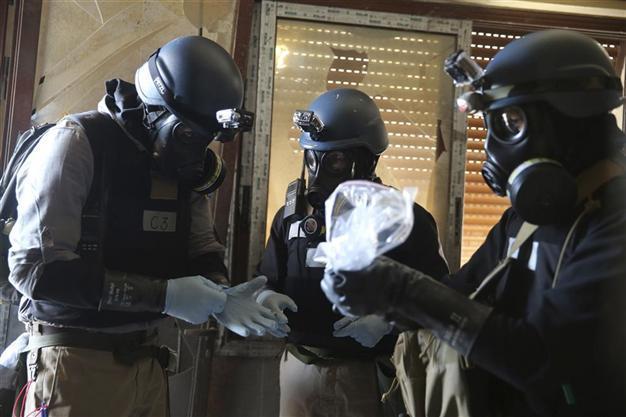Chemicals seized at Turkey’s Syria border raise questions
ANKARA

A UN chemical weapons expert, wearing a gas mask, holds a plastic bag containing samples from one of the sites of an alleged chemical weapons attack in the Ain Tarma neighbourhood of Damascus in this August 29, 2013 file photo. REUTERS photo
The main opposition Republican People’s Party (CHP) has raised questions over the seizure of chemical material, along with barrels of unidentified cargo, in vehicles which attempted to illegally cross the border from the Turkish side to the Syrian side over the weekend.
“One person has been arrested. Barrels which are suspected to contain chemical material were inside the vehicles. Traffic was from Turkey to Syria. Do not be surprised if a statement suggesting that the arrested person is a Syrian spy comes from the government,” CHP Deputy Chair Faruk Loğoğlu said Nov. 4.
Turkish patrol border units seized around one ton of sulfur in addition to eight sealed barrels, the contents of which were unknown, from a convoy trying to illegally enter the country from Syria on Nov. 2, the General Staff announced in a statement posted on its official website.
The convoy of three vehicles refused to stop as it attempted to illegally cross the border near the southeastern Turkish town of Reyhanlı, according to the statement.
Para-military police were forced to shoot out the tires of the vehicles to stop them, and three drivers jumped out and fled in the direction of Syria. One of them was arrested, the General Staff said, without specifying the nationality of the suspect. The haul of sulfur and the other unidentified substance will be examined by a team of army specialists, the statement said.
Chemical, biological, radiological and nuclear defense (CBRN) units from the Disaster and Emergency Management Presidency have been examining the seized material, noted the statement.
Loğoğlu, meanwhile, also voiced doubt that a case looking into allegations that radical Syrian rebel groups were seeking to procure materials that could be used to produce highly toxic sarin gas was being covered up.
Separately, CHP deputy Hurşit Güneş criticized the release of the primary suspect in the same case after a hearing by a local court in Adana on Oct. 30.
“We want this case not to be closed. If the case in Adana is closed and these terrorist elements are acquitted, then it will be a shame for Turkey. Turkey cannot be a place where al-Qaeda elements can be nurtured and can get rest,” Güneş said.
The suspect to whom Güneş referred, a 35-year-old Syrian citizen identified as Hytham Qassap, was accused of establishing a connection with a network in Turkey to convey chemical materials for the al-Qaeda linked al-Nusra Front and jihadist Ahrar al-Sham Brigades.
The indictment was based on the probe into chemicals seized in the southern province of Hatay late in May. It also contained Qassap’s testimony in which he allegedly confessed his links with the Ahrar al-Sham Brigades and moved to the city of Antakya following the instructions of its leader, Abu Walid.
A Financial Times article posted from the town of Öncüpınar in the southern Anatolian province of Kilis and published on Nov. 1 noted that the town’s 78,000 refugees now outnumbered the 60,000 locals.
“The fighters are in Turkey to rest, recover and regroup before the next onslaught in Syria, whether to prise the country from Mr. Assad’s grip, or to wage jihad, or both. Four fighters from the Syrian city of Homs sit cross-legged on the floor of their cramped sleeping quarters. On the wall beside them are the flags of the Syrian opposition, Turkey and the black flag of jihad. The men effusively praise Recep Tayyip Erdoğan, Turkey’s prime minister, for what they say is the free passage Ankara has allowed them over the border. ‘Who is our father? Who is our father?’ asks Abu Mahir, a fighter for a group known as the Farouk Brigades. ‘Father Erdogan; we worship him,’ the other men reply,” the Financial Times reported.
